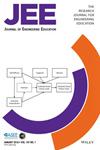Promoting sociotechnical perspectives of engineering during a summer bridge program
Abstract
Background
To address complex challenges of modern society, engineering education needs to help students develop sociotechnical perspectives of engineering. Research has documented efforts to incorporate sociotechnical thinking into undergraduate engineering education, but those perspectives must often compete with more dominant technocentric views. Research is needed to investigate how and why students do or do not adopt sociotechnical views.
Purpose/Hypothesis(es)
In this study, we investigated the extent to which students' views of engineering changed in the context of an Engineering Summer Bridge (ESB) program, in which engineering is promoted as a socially engaged practice.
Design/Method
We used a multiple case study methodology to investigate patterns across 24 ESB participants. We gathered multiple sources of data to investigate changes in participants' thinking, including pre/post surveys, weekly reflections during ESB, and follow-up participant interviews. We grouped participants based on the extent to which they added socially engaged perspectives to their perceptions of engineering. We then identified variables associated with those groupings.
Results
Approximately one-third of participants added socially engaged perspectives to their views of engineering. These students tended to have fewer prior engineering experiences prior to ESB and often self-identified as having limited prior knowledge of engineering. They were also more likely to hold motivations and interests oriented toward the public good.
Conclusions
Our study identifies variables that potentially support and inhibit students' development of socially engaged views of engineering. It highlights the importance of early learning experiences and suggests that technocentric perspectives can be well established even before students begin their undergraduate programs.

 求助内容:
求助内容: 应助结果提醒方式:
应助结果提醒方式:


